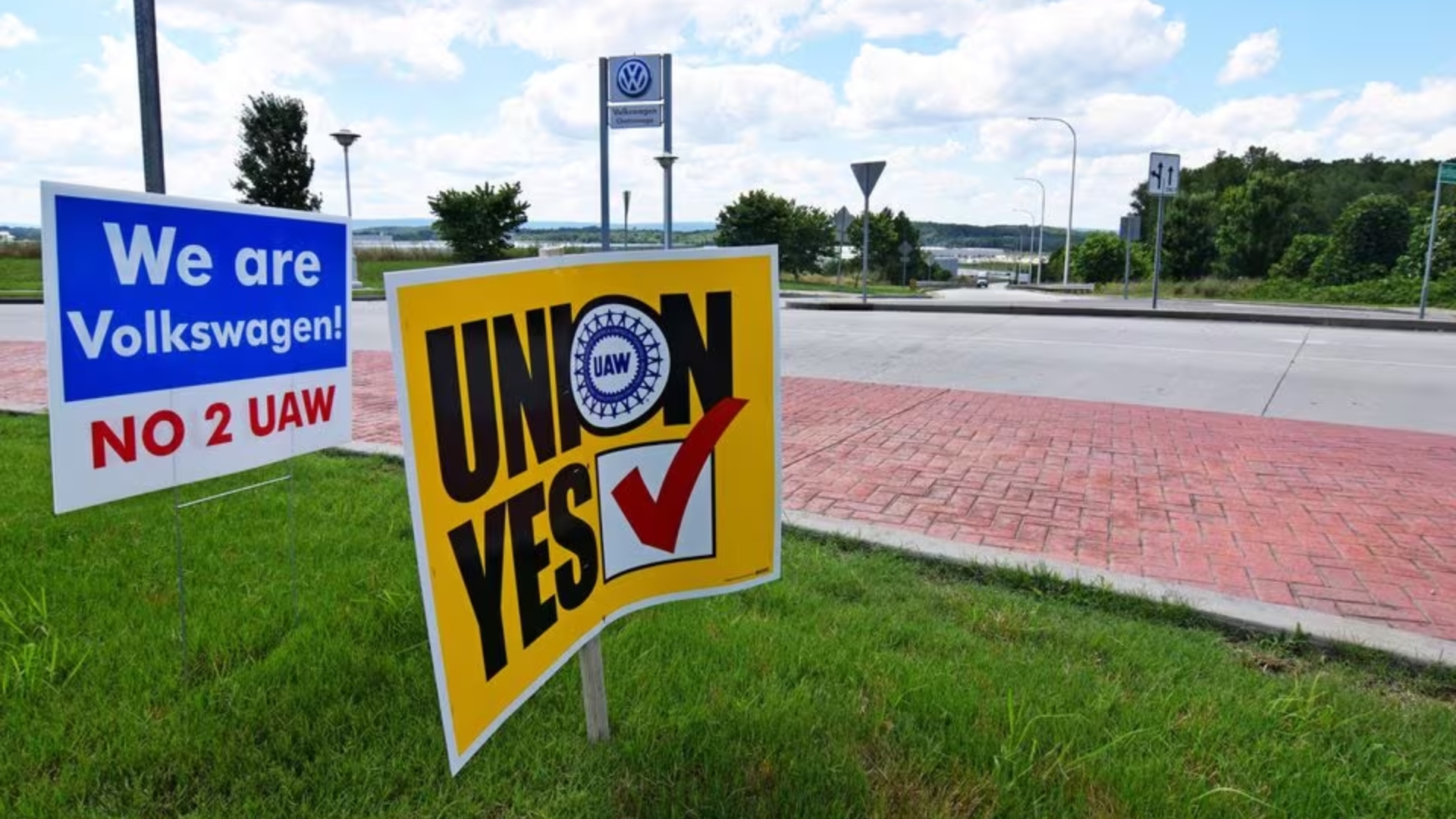DETROIT, (Reuters) – A Volkswagen plant nestled against dense forests and Interstate 75 on the southern border of Tennessee has become a battleground over worker representation that could sway the future of the American auto industry.
The United Auto Workers is attempting for the third time to organize the 4,300 eligible workers in Chattanooga, where VW assembles the ID.4 electric SUV. The vote at VW’s only nonunion plant globally is scheduled to begin on Wednesday and conclude late on Friday.
The UAW, which has been shrinking, sees the VW vote as the first of a series that would spread unions beyond Detroit-owned automakers and into the U.S. South, which has been unfriendly terrain for organized labor. A Mercedes-Benz factory in Vance, Alabama, may hold a vote soon.
The environment has never been better for the UAW. Public support for unions has soared in recent years and last autumn U.S. President Joe Biden walked picket lines outside Detroit, where the union secured record contracts with the Big Three automakers: General Motors, Ford Motor and Stellantis.
“This is the best chance they’ve ever had,” Cornell University labor professor Art Wheaton said of the UAW.
For decades, the union has struck out at southern auto plants. In addition to two narrow losses at VW previously, it sustained three more significant misses at southern factories owned by Nissan.
Pablo Di Si, head of Volkswagen’s North American business, told Reuters last month the company will remain neutral ahead of the vote.
Union-backing workers at the VW plant hope this time to win, and say they want better pay and benefits and improved plant safety.
Kelcey Smith, who joined a union organizing committee after being hired about a year ago, said the union’s deals following a six-week strike against the Detroit automakers inspired him. The UAW won record contracts, including double-digit pay increases and the return of cost-of-living adjustments.
Smith wants some of those perks himself.
“It showed not only me, but the rest of the country and the world, that if you just come together as a collective group, you can bring change for yourself and your families,” he said.
Some employees at the plant say the risks of organizing outweigh the potential rewards, worrying that increased labor costs for VW could endanger job security.
Anti-UAW organizations have also made their voices heard, with billboards near the Chattanooga plant urging passersby to visit a Web page that spotlights a union bribery scandal that resulted in federal convictions of several former UAW leaders. The current UAW leadership was elected after that issue was resolved with federal officials.
The opposition will test UAW President Shawn Fain as he embarks on an ambitious organizing drive across the South and West. Fain and his team have committed $40 million, through 2026 to organize more than a dozen nonunion shops owned by EV makers like Tesla and foreign automakers including Toyota Motor.
Fain has rejected descriptions of nonunion automakers as the enemy, portraying those workers instead as future UAW members.
RIDING DETROIT WINS
Victor Vaughn, 55, who has been part of the volunteer committee of VW employees who organized meetings at the local UAW hall, said momentum built within their ranks after the union’s wins in Detroit.
“They work for different companies, but they’re just like you and me, and they’re fighting for the same issues,” he said.
The new contracts in Detroit – including a 25% wage increase over four years – also caught the attention of Biden, who is courting UAW members as key voters, especially in Michigan, in this autumn’s election. His opponent, former President Donald Trump, has also held events in Michigan to woo auto workers.
“I want this type of contract for all autoworkers,” Biden said at a UAW event last November. He also supports the union’s broader organizing efforts.
Many nonunion automakers, including VW, offered raises after the Big Three talks, which many analysts saw as a move to keep their plants union-free.
Matching the UAW would be even costlier. Tesla would incur $1.2 billion in additional labor costs this year if it were to match UAW pay, according to Deutsche Bank.
Winning the VW vote is critical, however, because the UAW continues to shrink, from a high of 1.5 million members in the 1970s to 370,000 last year, its lowest level since 2009. The current organizing push targets 150,000 nonunion workers, which would double the UAW’s size.
The Volkswagen facility is the first of this group to gather enough worker support to hold an election with the National Labor Relations Board.
While UAW officials are confident about their chances in Chattanooga, narrow losses in 2014 and 2019 still haunt them.
Volkswagen has been more open to a UAW election in this round, said Georg Leutert, director of automotive at IndustriALL Global Union, a Switzerland-based federation of unions. However, some managers in the Tennessee plant have resisted unionization, he said.
Officials with IG Metall, a German union representing VW workers in that country, support the UAW.
Tennessee is a right-to-work state, meaning UAW membership would not be mandatory for plant workers.
Tennessee Governor Bill Lee said earlier this month that VW workers would “risk their futures” by voting to unionize. Tennessee has a GM plant in Spring Hill that is unionized.
For VW workers in Tennessee like Darrell Belcher, a 13-year veteran at the plant who previously opposed the union, the UAW offers no guarantees. He cited the recent layoffs or buyouts of factory workers at Stellantis and GM.
Belcher asks co-workers excited to join the UAW: “What do you actually expect to get, and what are you willing to lose?”
Reporting by Nora Eckert in Detroit Additional reporting by Victoria Waldersee and Christina Amann in Berlin Editing by Ben Klayman and Matthew Lewis











